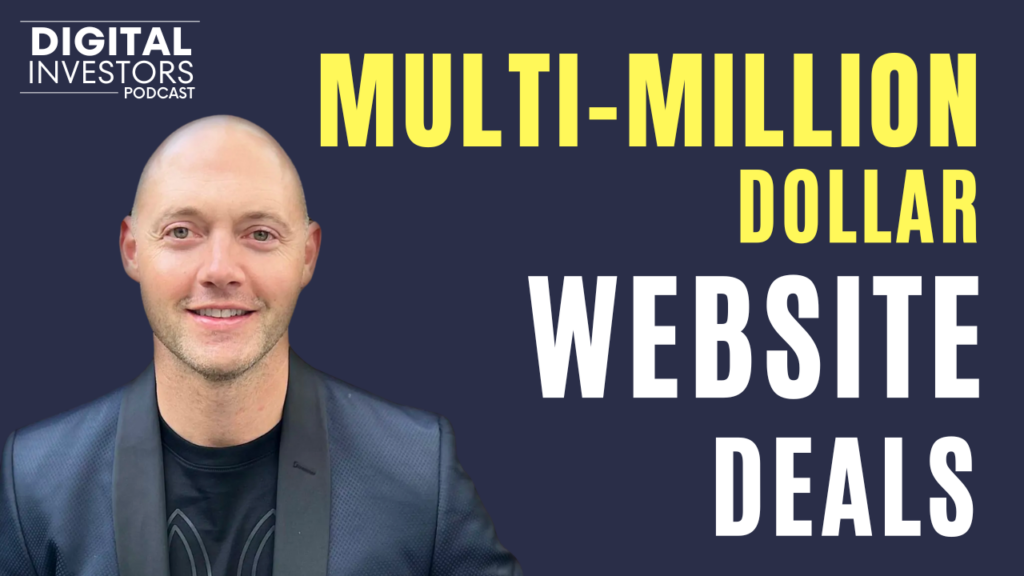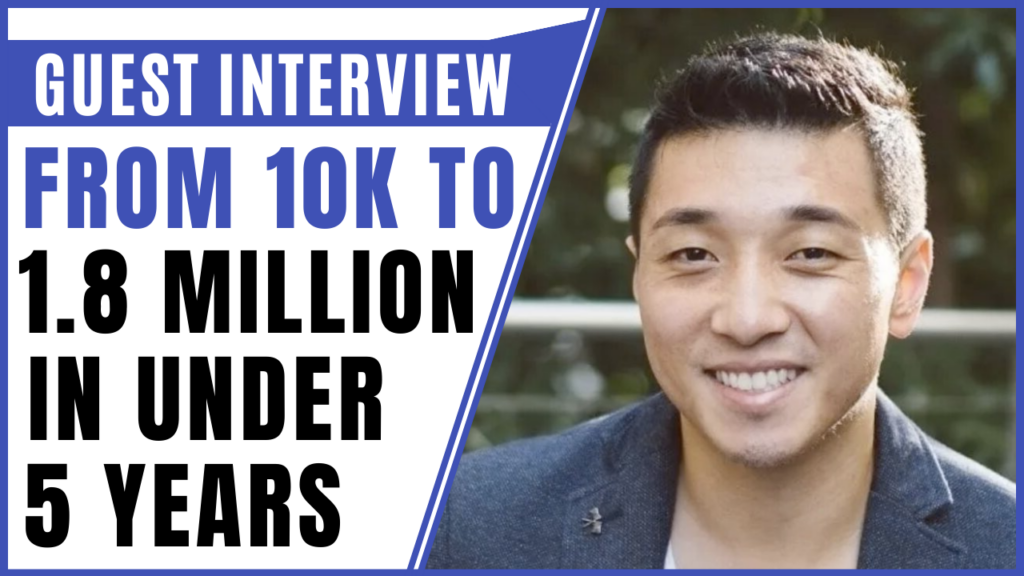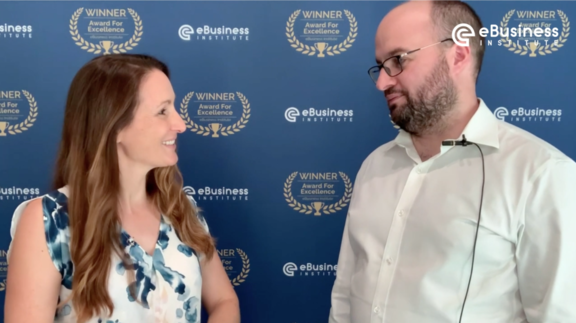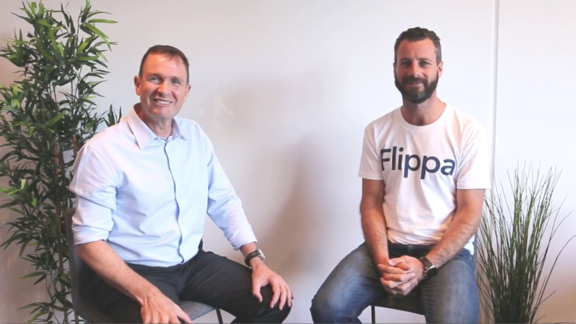Inspiring lessons by Izach Porter from Website Closers on what it takes to play in the bigger game of buying and selling websites in the 8 and 9 figures…
What’s the secret to turning websites from digital addresses into multi-million dollar empires?
Join Izach Porter, a 20-year veteran in mergers and acquisitions and the man behind deals worth up to $300 million, as he reveals the art of buying and selling websites on a mind-blowing scale.
You’ll hear the why digital agencies are so desirable and valuable, what buyers are looking for, how to finance multi-million dollar website deals, and much more, including how to increase the value of your digital agency before you sell it.
Izach has analysed thousands of deals and today you get to hear his insights.
Matt Raad: Hello again, everyone, and welcome to the Digital Investor Podcast. I’m your host, Matt Raad.
Today, we will be looking at the bigger game when it comes to website sales in the tens of millions of dollars. Also, what does it take to grow and sell these multimillion-dollar websites and online businesses?
My guest today, Izach Porter, specialises in selling online businesses up to $300 million. Yes, you heard it right – up to $300 million.
Izach has been in mergers and acquisitions for the last 20 years. He’s analysed thousands of deals. Not only that, but he also has a network of over a million buyers, including family offices, high net worth, and private equity firms.
So, Izach has a lot of experience looking at these big multimillion-dollar businesses. Thank you so much for coming on today.
Izach Porter: Thanks for having me, Matt. It’s good to talk with you again.
Matt: Firstly, who do you work with to facilitate those deals?
Izach: I work with WebsiteClosers.com. I’m a website closer, broker and franchisee. And all of my transactions are represented through the Website Closers platform.
My average transaction size has been about $8 million, excluding two really big deals I’ve listed this year. We consider that figure to be a lower to middle market here. So, we work at the large end of small business or the small end of big business.
Matt: Awesome. And you are also the host of The Deal Closers podcast.
Izach: Yes, we’ve been running that podcast for three years now.
Where is big money being spent for online businesses?
And why Digital Agencies are so desirable for big institutional investors…
Matt: You have over 20 years’ worth of extensive experience in analysing thousands of businesses, particularly multimillion-dollar websites. It would be great to see some insights into what it’s like to grow, sell and structure those deals.
What have you seen in the marketplace over these last few years? What sweet spots are you working in, and where is the most activity?
Izach: We’ve seen a lot of good transaction flow and strong multiples in the digital agency space.
We’ve represented a number of digital marketing, performance marketing, SEO, and back-link building agencies. We’ve also sold some content sites. However, online service-based businesses that have some form of recurring revenue are very desirable right now.
We’ve certainly seen a lot of e-commerce brands. Particularly in 2021 and 2022, we were getting strong valuations in e-commerce brands, and we still continue to represent a number of larger brands. We’ve seen the multiples come down about 40 basis points over the last 12 months, but still, we’re getting deals done with good valuations. The deal structures have changed a little bit.
So, those are two of our big key focus areas from an industry perspective.
Matt: Awesome. This will be music to the ears of a lot of our readers because many of our members are very successful at running digital agencies, particularly here in Australia.
The trend that we’re seeing in America is coming to Australia. Suddenly, the valuations are going well; they’re very attractive.
What’s the driving force behind the high valuations of Digital Agencies?
Matt: What’s the typical size digital agency you’re helping to facilitate the sale of over there in America?
Izach: We’ve represented agencies of all sizes. But in particular, my business partners and I are working with businesses in the $5-20 million range.
Part of what we’ve seen driving these valuations are strategic buyers who are either:
- Funded private equity groups that have an existing platform investment. They have some type of digital agency and are bolting onto that.
- Or other large agencies that are just looking to acquire customers.
Driving force #1: Buying digital agencies is a quick way to acquire existing talent
Izach: The driving thesis for some of those investors is that many new technologies can now create efficiencies within agencies. And so, they’re looking at ways to acquire agencies, keep the human capital talent, and cut out some of the operational overhead.
Driving force #2: It gives you the ability to cross-sell other digital marketing services
Izach: And then they’re looking at cross-service or cross-sells. For example, if I’m an SEO agency and I buy a back-link agency, I can sell to both sides of the customers, or I can sell social media marketing services to SEO clients as well. Things like that.
What are institutional buyers looking for when acquiring a multi-million dollar Digital Agency?
Matt: Let’s have a look at the sellers of these digital agencies who are in the $5-10 million range. How long would those businesses have been around for?
1. An established digital agency with a solid book behind it
Izach: We’re seeing that a lot of these are between 5-10 years old. That’s been a pretty common theme in the digital agency space.
Buyers are looking for the business’ book and team. And so, those companies with a little bit more of a track record tend to have a stable book of business and a pretty well-developed team.
Matt: When you analyse them, are they digital agencies that were started by building websites for small local businesses? Or are they specialised in certain niches? What’s their typical business model?
Izach: That’s an interesting question. I think that a lot of these companies started with some kind of web development. I think the reason they’ve moved away from web development is because it tends to be non-recurring work and pretty low margin. But it is a good funnel to get new customers into a business.
2. An EBIT ($ Profit) of $1 million or more
Matt: What sort of EBITs are they doing? For our readers, EBIT is earnings before interest and tax, so basically profits.
What sort of profits are these multi-million dollar digital agencies typically making per annum?
Izach: There are agencies across the entire gamut from unprofitable to tens of millions of dollars profit. But where we’ve seen good buyer interest in the $1-5 million EBIT range. Businesses in that space tend to run to $5 million in profits.
3. A Digital Agency that has an agile team and a level of automation
Matt: At that level, what’s the typical staffing you’ve seen for those digital agencies?
Izach: That’s also changing dramatically right now because many buyers are looking at ways to reduce non-customer-facing staff or outsource.
We’re seeing a lot of talent in creatives and media buying being outsourced and automated. But generally, those agencies have 20 to 50 geographically dispersed employees.
At least some portion of the staff is going to be located in the Philippines, India, or Pakistan. And then often, at least in the US, we see client relationship managers (or the people who are directly talking to clients or part of the sales staff) based in the US.
They typically don’t have a physical office at this point. Most of them have gone to a full work-from-home model, making attracting talent easier. You can hire them anywhere.
Matt: Okay, so compared to bricks and mortar businesses, they’re a pretty agile setup.
Izach: Absolutely.
I did bricks-and-mortar M&As for a big part of my career, and I think that’s a common theme across digitally native businesses. These businesses generally have lower overheads, higher margins, and a flatter organizational structure.
What size Digital Agency is easier to sell?
Matt: Looking at the buyers’ point of view, that’s obviously why they’re so attracted to these types of businesses. Are digital agencies easier to sell when they’re in the multi-million dollar range?
Izach: Yes, they’re easy to find buyers for. We get really strong responses for these sales. When we have an agency with $2-5 million EBIT, we get many offers on those deals.
Closing any deal is always a significant amount of work. So, I wouldn’t necessarily say that part is easy. Getting through due diligence and getting to the closing table takes effort. But we have a very high closing rate. I would say our success rate in closing the listings we represent is over 80%.
Matt: As you’ve mentioned, you’ve got lots of buyers there. So, it’s easier to get a lot of interest in a digital agency (or an online business) with an EBIT of $1-5 million.
How WebsiteClosers.com get top dollar when selling 8-figure websites
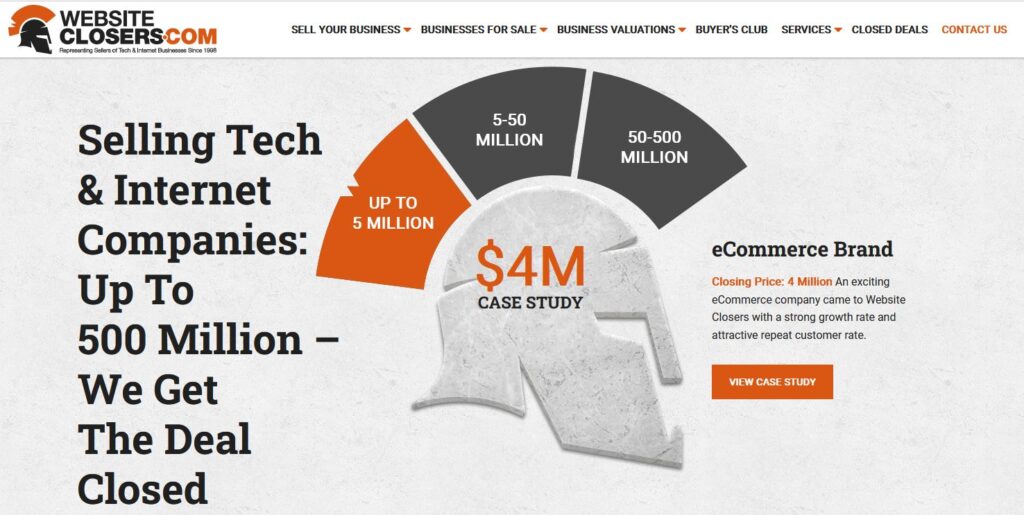
Izach: Most sellers anticipate that the hardest thing to do will be finding a buyer, which is not the case.
1. Find multiple buyers which gives you the power of negotiation
Izach: For us, finding the buyer is generally the easy part. Finding multiple buyers is relatively easy, and we have a process to do that. We cast a broad net and do a lot of strategic outreach, so we know how to get the buyers. That’s where most of our work comes in.
The additional value we add through the process as brokers is in negotiating the terms of the deal to get to an agreement. We’re often looking at multiple offers and using those offers to negotiate back and forth with sellers and buyers to try to get a deal that makes sense for both sides.
2. Thorough website due diligence prior to closing the deal
Izach: Then we get through to the closing. So, once you go under contract and get an assigned LOI (letter of intent), everybody agrees to the high-level business terms. You go through the due diligence process, including financial due diligence, legal due diligence, and tax due diligence.
Many companies we represent have operations in more than one country. So, we also have attorneys involved who are licensed in multiple geographies. That’s where a lot of the work comes in for getting those deals across the finish line. And that’s where we spend most of the time.
Who are the buyers for big multi-million dollar website deals?
Matt: Looking at these $150 million businesses in the online marketplace, is it easy to find potential buyers for something like that? What’s happening in that space?
Izach: Well, there are fewer buyers for that particular deal because it’s got some uniqueness to it.
When we look at larger deals, you don’t need a hundred buyers to sell a $150 million company. You only need five or six buyers. Of course, it’s very helpful to have more than one. You only need one buyer, but having more is very helpful.
As you know from your experience, Matt, when you have at least two buyers, then you’ve got a process. When you’re dealing directly with only one other buyer, both sides have little leverage, and it can be hard to negotiate. It can be challenging for sellers to get a good read on the market and know if they’re getting a fair valuation.
Matt: Who are the typical buyers in that $100+ million range?
Izach: They’re almost all private equity groups or family offices. They are institutional and professional buyers. And they typically have other businesses with a similar business structure.
So, there are experienced buyers in this space who are funded with capital from either private capital or bank debt. And a vast majority of them also have private capital.
Izach Porter from WebsiteClosers.com shares an example of a $4 million website deal
…and shows how you could 20x a website’s value in 5 years…
Matt: How would those numbers work for someone wanting to get into a $4 million website business? Especially because these businesses have more access to capital in America.
Do you have an example? How would the numbers work for a $4 million business acquisition?
Izach: I can give you an example that we published recently on a deal structure for an e-commerce site we sold.
This was an e-commerce brand. About 30% of their traffic is coming from paid media. We listed the business for over $4 million. The closing transaction was in the EBIT range of $800,000 of earnings in the trailing 12-month period. Within the last year, the company had made about $800,000, and the business was growing at a 30% growth rate.
Matt: Nice.
How the buyer raised $4 million dollars for her website purchase
Izach: For USA-based businesses and buyers, we have access to the Small Business Loan Administration program. And the program we use is called the 7(a) loan program.
Basically, you can get loans for financing businesses. In fact, you can get financing up to 90% to acquire a business with a 10-year payback. So, that’s really compelling.
We sell businesses all over the world, and the SBA loan program doesn’t apply to those international businesses. But there are plenty of ways to get those deals done, too. We have private investors, and we can structure deals with some portion of stellar financing and things like that.
But in this particular deal, the buyer put down $400,000, and the seller held a $600,000 promissory note, and the bank provided a $3 million loan. So that comes up with your $4 million purchase price.
She was then able to make $400,000 profit per year after repaying debt…
Izach: And the interesting thing was that the company generated $800,000 in profit. So, after the loan payments of about $400,000 a year, there’s $400,000 of net free cash flow left over.
So, the buyer returned her cash-on-cash investment, and she put in $400,000. She returned $400,000 to herself in the first 12 months, so it was a 100% cash-on-cash return in 12 months.
…at the existing growth rate, the business could be valued at $12.5 million in 5 years
Izach: In this particular example, we looked at what would happen if the business continues to grow at the 30% rate it has had for the last two years. What would that look like in five years? It’s a pretty compelling investment thesis, even if you didn’t get to that specific growth rate.
But at a 30% compounded annual growth rate, the company would grow to about $2.5 million in earnings in less than five years and have a valuation of about $12.5 million.
So, for an initial investment, the buyer would’ve been making a cash flow of over $400,000 net a year. If we then included the growth for those four years from when she returned her initial investment and had more than a 20x return in five years.
Matt: And that’s how you do a 20x return.
The buyer was a professional looking to leave corporate…
Matt: Who was the buyer? Is she a typical buyer of that $4-5 million range?
Izach: The buyer was a professional looking to get out of corporate America. She accumulated some savings, leveraged it with a loan, and bought herself a business to operate.
The seller helped the buyer transition the business with training for a transitional period, and so that’s a good success story.
How much experience do you need when buying a multi-million dollar website?
Matt: Out of interest, did she have much experience in running an e-commerce business or anything? Or did the seller basically teach her the ropes?
Izach: She did have some experience in the space. She knew about paid traffic, and she was somewhat technically sophisticated. So, she wasn’t a complete newbie.
We certainly have sold businesses to people without a lot of experience. I think one of the things I always advise the buyers is:
“If you don’t have experience, you need a good mentor. You need some training and a coach to help you get ramped up.” – Izach Porter, Website Closers.com
Most people will start with a relatively smaller deal and build up. In this case, the buyer had owned some other websites that had given her confidence and some skillset, and this was her first real purchase.
Matt: That’s what we teach here at eBusiness Institute, so thank you for sharing that story, Izach. We want to start out small, get some experience, and then step into these bigger businesses.
How to finance multi-million dollar website deals?
Matt: If you’re lucky enough to be in America, it is much easier to get financing to buy websites. Now, that’s an interesting space because we don’t have that here in Australia. How much can you borrow on these SBA loans?
Izach: The SBA loan program goes up to $5 million. So, you can borrow $5 million, which means you could foreseeably get into a $6-8 million transaction if you had some capital to put down and the seller held the capital.
From an EBIT perspective, companies generating $2-5 million in EBIT are great businesses for us to sell. Businesses with a transaction size of $4-20 million are where we’re doing a lot of volume in enterprise value.
…And who are the buyers at this bigger level of website investing?
Izach: There are a few inflection points here:
Buyer #1: Individuals
Izach: We have those businesses earning under $1 million. An example of this is the company we just talked about making $800,000 a year.
Those businesses are often acquired by individuals who may have a couple of other businesses in the space. But they’re buying those businesses using SBA loans. And they’re buying them to operate themselves or to add their team into once you get over $1 million in earnings.
Buyer #2: Institutional Buyers
Izach: We’re seeing quite a lot of buyers who are institutional buyers and private equity strategic acquirers who have existing holdings or a portfolio business. And so, they’re bolting on a $1-2 million earning business onto that. Or it could be a family office that maybe wants to enter the space with a platform.
Why purchasing an online business as a bolt-on is becoming a popular way of investing with larger buyers
Izach: There’s also this distinction between a bolt-on and what I’d call institutional.
I use the term institutional investors to encompass private equities and family offices. But if it’s more than $3-5 million in earnings, a lot of businesses view that platform as a business that can stand on its own and be part of a portfolio.
However, if it’s under $3 million in earnings, they’ll probably look for another business and bolt that on.
Maybe if you have an existing platform generating $3 million in earnings, you might go out and buy other businesses making $1-3 million and add those in (where it makes sense). We’ll end up with a consolidated business with $10 million in earnings, and then they’ll resell that.
Matt: Perfect. So that’s basically the M&A game in a nutshell at that level.
Izach: Yes, because that’s called multiple expansion. As the businesses get bigger, the multiples that buyers pay get larger.
How merging online businesses creates higher multiples for investors
Izach: The classic private equity investment strategy is that you buy a business for 3-4x multiple, and you put a couple of these businesses together. You have to execute on that consolidation of the operations. But then you end up with a business that is worth 6-7x its earnings.
So, you create value through combining the cash flows of these businesses. On top of that, if you can organically grow the businesses as well, that’s when you can get into these really significant returns.
This is why $2 million website businesses are so attractive to investors
Matt: That’s why you told me earlier that you are seeing that inflection point at around $2 million, and that’s where things start to get really interesting.
Izach: $2 million EBIT is an inflection point for a couple of reasons:
- You bring in institutional investors who are looking for these bolt-on businesses. And you also have platform companies that can stand on their own with $2 million earnings.
- And then you also have access to non-SBA capital. So, commercial banks will lend on what we call EV-reliant or collateral-light loans for companies generating more than $2 million in earnings.
How investors are obtaining loans from banks for their online businesses
…and the power of having recurring income in your online business…
Matt: To clarify, Izach is talking $2 million in actual profit, EBIT.
Izach: That’s right. And most of these digitally native businesses don’t have a lot of tangible assets like a brick-and-mortar company might have, right? They don’t have forklifts and often don’t own real estate. They don’t have a fleet of trucks driving around, and their biggest asset will typically be inventory and receivables.
They have intangible assets such as the brand’s value, trademarks, intellectual property, etc. But banks like to think of collateral as tangible physical assets located in a building somewhere; these digitally native businesses don’t have it.
And so, the banks want to see bigger businesses earning over $2 million before they’ll be comfortable lending because it’s more secure when a business has $2 million of cash flow.
It’s a more stable business that a bank can lend against. They can monetise the value of that cash flow and lend against that. And so, they’re relying on the value of the business as their collateral rather than the assets of the business.
The options that become available to you when you own a 7 or 8 figure online business
Matt: This should be opening our readers’ eyes. There is a whole game here that you can play if you’ve got the big goal.
There are these different levels here:
- There’s the level where you start out, and you learn this stuff.
- Then there’s the next level, where you might get into a seven-figure online business like your client, Izach. She bought the $4 million business with $400,000 down.
- But then you can start thinking about the next level, getting to that profit of $2 Million plus.
Like Izach said, there’s an inflection point there. That’s when things start to get really interesting. At that level, someone should definitely be talking to someone like yourself, Izach, or anyone at WebsiteClosers.com.
Also, at that level, we’re getting into the private equity sphere. Typically, someone then is raising funds and doing this at a higher level.
Izach: That’s right. And within that level, there are private equity groups that are funded with committed capital behind them.
There are sponsor deals where you’ve got investors who may take some operational role in the business. But they will go out and try to raise capital after they get a deal under contract.
Then, there are family offices owned by wealthy families with a lot of capital. They form a business entity to go out and invest their own capital and make a return on it with the acquisition of operating businesses.
Matt: Awesome. So, the bottom line is once your business becomes highly profitable, you’ve got many options at every level.
Why recurring income in your Digital Agency is so valuable for investors
Matt: Coming back to the digital agency space, it now makes sense why they’re so attractive. They are very profitable, they’re nimble, and have recurring income.
Does having the recurring income make it much easier for private equity firms in terms of borrowings as well?
Izach: That’s right. The recurring revenue component gets lenders much more interested in the business. Again, what a lender is going to look for is directly related to what drives valuation, which is the stability of cash flow over time.
The more stable the cash flow is, the more somebody will be willing to give you a loan against it, and the more they will be willing to pay against it.
An extreme example of that is SaaS businesses (we also sell software businesses). And so, say you have a digital agency in this space of $2-5 million of EBIT; they might be in the 4.7-6x multiple range.
Whereas for SaaS businesses, a relatively small business will be around 6-10x multiple, even at the same size here. The reason being is with software, you have an upfront development cost, and then it’s just a cash flow cow.
After that, you’ve got people paying you $19, $29, $39, etc. monthly. And if you can sell those services, every incremental sale costs you nothing at that point.
So, you’ve still got to maintain the business and keep the software up to date. However, SaaS businesses end up getting a higher multiple because of their cash flow generation potential.
Digital Agencies with recurring income are attracting strong multiples
Izach: I would say that leveraged digital agency businesses are the next step down from those really strong multiples. But you still need a team that’s constantly producing. It could be performance marketing, social media marketing, SEO, or back-links, etc.
You still need a team that’s out doing those things every day to perform for your clients. But those clients will continue to pay you monthly for those services.
Matt: That’s awesome. So digital agencies are still on pretty high multiples, of around 4.7-6x.
Izach: Yes, that’s what we’ve been seeing over the last 12 months for these agencies that are making a couple of million dollars of profit.
Matt: Wow, that’s pretty cool. Although nothing ever beats SaaS, does it?
Izach: My business partner and I were just presenting at an SEO conference two weeks ago called OMG Live down in Cocoa Beach. And there were hundreds and hundreds of these SEO agencies out there in this space. It was very surprising.
It’s always surprising to me how many people don’t know how much their businesses are worth.
How to increase the value of your Digital Agency prior to selling
Matt: What do you need to do 6 months, 12 months, or 24 months before you want to sell?
What are the things you can be doing right now that will add value to your business, even if you’re not planning on selling it anytime soon?
Izach: We love to talk to businesses early and advise them on how to set up their structure, team, contracts, etc.
One example of a low-hanging fruit is checking whether your contracts are assignable. That way, when it comes time to sell, the buyer doesn’t have to go and renew all the contracts with every client you’ve got.
Something you could include is the terms of the contracts. You can have a 30-day cancellation period, but if you’ve got a six-month contract, it’s considered more valuable than just having a 30-day renewable contract or not having a contract in place at all.
A lot of companies operate without contracts, but I always say just give your client a short cancellation term and have a contract in place because it will add value to a buyer.
Why you should talk to a professional broker before you want to sell your Digital Agency
Matt: I want to reiterate Izach’s advice here. People don’t realise how valuable the digital assets they’re sitting on are, regardless of whether it’s a digital business, a digital agency, a content site, a SaaS site, or an e-commerce site. You’re just in the trenches working away at it.
But, Izach, one of the things that you specialise in where you can help people is to:
- Get a valuation for your online business.
- And to start thinking about the exit a year or two in advance.
Are you happy to chat with people even a year or two in advance?
Izach: Of course! And I think in this space, if you own a company worth $10 million, you need to think about 12, 18 months ahead of time what to do to sell it.
People come to us, and they’re ready to sell for a variety of reasons. Maybe they’ve had a partner that exited, and we’re happy to take a company to market wherever it’s at, right? We’ll do that.
But if given the coefficient of some extra time, there are things we can do that can add significantly to the valuation. We can make an exit roadmap. We can form a full exit plan and show on a quarterly rolling basis how that valuation will change if you execute some of the steps we advise you to take.
So, we’re always happy to have those conversations and talk with people upfront. In fact, that’s how almost a hundred percent of my business comes from referrals. So, I work with people and advise them. And once they start to see that value, that’s how I get other referrals. So, having those conversations is what we do every day.
Matt: That is awesome, Izach.
So, if you’re reading this and are in a position where you have a $1+ million EBIT online business, make sure you reach out to Izach Porter from Website Closers.
Izach: Thanks, Matt. Talking deals is what I love to do, so I’m happy to do it anytime.

